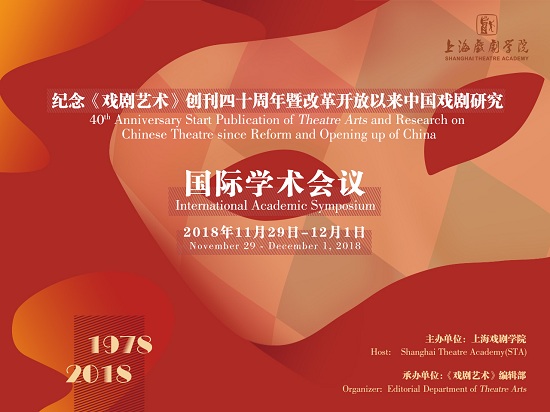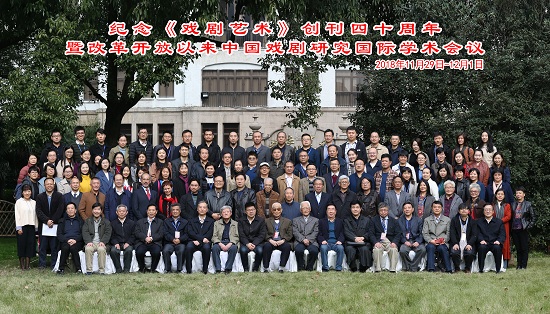17 December 2018
2018 marks the 40th anniversary of reform and opening up in China, and also the 40th anniversary of the publication of Theatre Arts. From 29 November to 1 December 2018, the International Academic Symposium in Commemorating the 40th Anniversary of the Publication of Theatre Arts and the Research on Chinese Theatre since the Reform and Opening-up in China sponsored by Shanghai Theatre Academy and organized by the Editorial Office of Theatre Arts was successfully held in Shanghai. More than 100 experts and scholars from universities and research institutes at home and abroad attended the symposium and conducted warm and in-depth academic discussions, experience sharing and opinions exchange. The symposium had eight keynote speeches, and nearly 70 scholars read out papers on the leading edge trend of theatre theory and art practice, modern and contemporary drama history, ancient traditional opera history, modern and contemporary traditional opera development, theatre cultural exchanges, theatre education and other related fields, reflecting a distinct sense of issues, diverse research methods and rich academic content, which can be called a collection of highlights of theatre research achievements in the past 40 years since the reform and opening up in China, thus having a great and far-reaching academic significance.

At the opening ceremony, Professor Gong Baorong, Editor-in-Chief of Theatre Arts, presided over the event and read out the speech of Professor Huang Changyong, President of Shanghai Theatre Academy, and also introduced the development of Theatre Arts in the past 40 years as a journal of Shanghai Theatre Academy. Subsequently, Professor Xia Bo from Central Academy of Drama, who is Deputy Editor-in-Chief of Theatre, delivered a speech as a representative of the peer journals, Professor Karina Stefanova from Bulgarian National Academy of Drama and Film Arts spoke as a representative of the editorial board, and Professor Marcos Martinez from University of California School of Arts spoke as a representative of the authors.
The keynote speech session was chaired by Professor Li Wei, Deputy Editor-in-Chief of Theatre Arts. Eight experts and scholars made keynote speeches focusing on the development of Chinese theatre since the reform and opening up. These speakers included Professor Dong Jian of Nanjing University, Liao Ben, former Vice-Chairman of China Federation of Literary and Art Circles, Professor Lu Wei of Nanjing University, Professor Fu Jing of Nanjing University, Liao Quanjing, former Chairman of Sichuan Provincial Theatre Association, Professor Chen Jun of Shanghai Theatre Academy, Professor Seto of Setsunan University of Japan, etc.
On the afternoon of the 30th, the “Conference Commemorating the 40th Anniversary of the Publication of Theatre Arts” was held in Foxi Building, Shanghai Theatre Academy. On the afternoon of the same day, the group discussion session of the academic conference on "Research on Chinese Theatre since Reform and Development" was held in Shanghai Hotel, which run for two half days with six sessions where over 60 experts and scholars delivered speeches discussing a range of topics such as modern and contemporary drama history, ancient traditional opera history, modern and contemporary innovation of traditional opera, drama cultural exchange, drama education and so on.

On the morning of 1 December, Yang Yang, Vice President of Shanghai Theatre Academy, delivered a closing speech to congratulate the successful holding of the symposium, and put forward even higher expectations for the development of Theatre Arts in light of his own experience in running the journals and magazines. This significant academic symposium will certainly promote the development of Drama Arts and, at the same time, it also foreshadows a new situation for the expansion and sublimation of Chinese theatre research. With this, the International Academic Symposium in Commemoration of the 40th Anniversary of the Publication of Theatre Arts and the Research on Chinese Theatre since the Reform and Opening-up in China was successfully concluded.



